- Home
- L. M. Montgomery
Anne of Green Gables (Penguin) Page 11
Anne of Green Gables (Penguin) Read online
Page 11
‘Not go to the picnic!’ Anne sprang to her feet and clutched Marilla’s hand. ‘But you promised me I might! Oh, Marilla, I must go to the picnic. That was why I confessed. Punish me any way you like but that. Oh, Marilla, please, please, let me go to the picnic. Think of the ice-cream! For anything you know I may never have a chance to taste ice-cream again.’
Marilla disengaged Anne’s clinging hands stonily.
‘You needn’t plead, Anne. You are not going to the picnic and that’s final. No, not a word.’
Anne realized that Marilla was not to be moved. She clasped her hands together, gave a piercing shriek, and then flung herself face downwards on the bed, crying and writhing in an utter abandonment of disappointment and despair.
‘For the land’s sake!’ gasped Marilla, hastening from the room. ‘I believe the child is crazy. No child in her senses would behave as she does. If she isn’t she’s utterly bad. Oh, dear, I’m afraid Rachel was right from the first. But I’ve put my hand to the plough, and I won’t look back.’
That was a dismal morning. Marilla worked fiercely and scrubbed the porch floor and the dairy shelves when she could find nothing else to do. Neither the shelves nor the porch needed it — but Marilla did. Then she went out and raked the yard.
When dinner was ready she went to the stairs and called Anne. A tear-stained face appeared, looking tragically over the banisters.
‘Come down to your dinner, Anne.’
‘I don’t want any dinner, Marilla,’ said Anne sobbingly. ‘I couldn’t eat anything. My heart is broken. You’ll feel remorse of conscience some day, I expect, for breaking it, Marilla, but I forgive you. Remember when the time comes that I forgive you. But please don’t ask me to eat anything, especially boiled pork and greens. Boiled pork and greens are so unromantic when one is in affliction.’
Exasperated Marilla returned to the kitchen and poured out her tale of woe to Matthew, who, between his sense of justice and his unlawful sympathy with Anne, was a miserable man.
‘Well now, she shouldn’t have taken the brooch, Marilla, or told stories about it,’ he admitted, mournfully surveying his plateful of unromantic pork and greens as if he, like Anne, thought it a food unsuited to crises of feeling, ‘but she’s such a little thing — such an interesting little thing. Don’t you think it’s pretty rough not to let her go to the picnic when she’s so set on it?’
‘Matthew Cuthbert, I’m amazed at you. I think I’ve let her off entirely too easy. And she doesn’t appear to realize how wicked she’s been at all — that’s what worries me most. If she’d really felt sorry it wouldn’t be so bad. And you don’t seem to realize it neither; you’re making excuses for her all the time to yourself — I can see that.’
‘Well now, she’s such a little thing,’ feebly reiterated Matthew. And there should be allowances made, Marilla. You know she’s never had any bringing up.’
‘Well, she’s having it now,’ retorted Marilla.
The retort silenced Matthew if it did not convince him. That dinner was a very dismal meal. The only cheerful thing about it was Jerry Buote, the hired boy, and Marilla resented his cheerfulness as a personal insult.
When her dishes were washed and her bread sponge set and her hens fed Marilla remembered that she had noticed a small rent in her best black lace shawl when she had taken it off on Monday afternoon on returning from the Ladies’ Aid. She would go and mend it.
The shawl was in a box in her trunk. As Marilla lifted it out, the sunlight, falling through the vines that clustered thickly about the window, struck upon something caught in the shawl — something that glittered and sparkled in facets of violet light. Marilla snatched at it with a gasp. It was the amethyst brooch, hanging to a thread of the lace by its catch!
‘Dear life and heart,’ said Marilla blankly, ‘what does this mean? Here’s my brooch safe and sound that I thought was at the bottom of Barry’s pond. Whatever did that girl mean by saying she took it and lost it? I declare I believe Green Gables is bewitched. I remember now that when I took off my shawl Monday afternoon I laid it on the bureau for a minute. I suppose the brooch got caught in it somehow. Well!’
Marilla betook herself to the east gable, brooch in hand. Anne had cried herself out and was sitting dejectedly by the window.
‘Anne Shirley,’ said Marilla solemnly, ‘I’ve just found my brooch hanging to my black lace shawl. Now I want to know what that rigmarole you told me this morning meant.’
‘Why, you said you’d keep me here until I confessed,’ returned Anne wearily, ‘and so I decided to confess because I was bound to get to the picnic. I thought out a confession last night after I went to bed and made it as interesting as I could. And I said it over and over so that I wouldn’t forget it. But you wouldn’t let me go to the picnic after all, so all my trouble was wasted.’
Marilla had to laugh in spite of herself. But her conscience pricked her.
‘Anne, you do beat all! But I was wrong — I see that now. I shouldn’t have doubted your word when I’d never known you to tell a story. Of course, it wasn’t right for you to confess to a thing you hadn’t done — it was very wrong to do so. But I drove you to it. So if you’ll forgive me, Anne, I’ll forgive you and we’ll start square again. And now get yourself ready for the picnic.’
Anne flew up like a rocket.
‘Oh, Marilla, isn’t it too late?’
‘No, it’s only two o’clock. They won’t be more than well gathered yet and it’ll be an hour before they have tea. Wash your face and comb your hair and put on your gingham. I’ll fill a basket for you. There’s plenty of stuff baked in the house. And I’ll get Jerry to hitch up the sorrel and drive you down to the picnic ground.’
‘Oh, Marilla,’ exclaimed Anne, flying to the washstand. ‘Five minutes ago I was so miserable I was wishing I’d never been born and now I wouldn’t change places with an angel!’
That night a thoroughly happy, completely tired-out Anne returned to Green Gables in a state of beatification impossible to describe.
‘Oh, Marilla, I’ve had a perfectly scrumptious time. Scrumptious is a new word I learned today. I heard Mary Alice Bell use it. Isn’t it very expressive? Everything was lovely. We had a splendid tea and then Mr Harmon Andrews took us all for a row on the Lake of Shining Waters — six of us at a time. And Jane Andrews nearly fell overboard. She was leaning out to pick water lilies and if Mr Andrews hadn’t caught her by her sash just in the nick of time she’d have fallen in and prob’ly been drowned. I wish it had been me. It would have been such a romantic experience to have been nearly drowned. It would be such a thrilling tale to tell. And we had the ice-cream. Words fail me to describe that ice-cream. Marilla, I assure you it was sublime.’
That evening Marilla told the whole story to Matthew over her stocking basket.
‘I’m willing to own up that I made a mistake,’ she concluded candidly, ‘but I’ve learned a lesson. I have to laugh when I think of Anne’s “confession”, although I suppose I shouldn’t, for it really was a falsehood. But it doesn’t seem as bad as the other would have been, somehow, and anyhow I’m responsible for it. That child is hard to understand in some respects. But I believe she’ll turn out all right yet. And there’s one thing certain, no house will ever be dull that she’s in.’
15
A Tempest in the School Teapot
What a splendid day!’ said Anne, drawing a long breath. ‘Isn’t it good just to be alive on a day like this? I pity the people who aren’t born yet for missing it. They may have good days, of course, but they can never have this one. And it’s splendider still to have such a lovely way to go to school by, isn’t it?’
‘It’s a lot nicer than going round by the road; that is so dusty and hot,’ said Diana practically, peeping into her dinner basket and mentally calculating if the three juicy, toothsome, raspberry tarts reposing there were divided among ten girls how many bites each girl would have.
The little girls of Avonlea school always pooled
their lunches, and to eat three raspberry tarts all alone or even to share them only with one’s best chum would have for ever and ever branded as ‘awful mean’ the girl who did it. And yet, when the tarts were divided among ten girls you just got enough to tantalize you.
The way Anne and Diana went to school was a pretty one. Anne thought those walks to and from school with Diana couldn’t be improved upon even by imagination. Going around by the main road would have been so unromantic; but to go by Lovers’ Lane and Willowmere and Violet Vale and the Birch Path was romantic, if ever anything was.
Lovers’ Lane opened out below the orchard at Green Gables and stretched far up into the woods to the end of the Cuthbert Farm. It was the way by which the cows were taken to the back pasture and the wood hauled home in winter. Anne had named it Lovers’ Lane before she had been a month at Green Gables.
‘Not that lovers ever really walk there,’ she explained to Marilla, ‘but Diana and I are reading a perfectly magnificent book and there’s a Lovers’ Lane in it. So we want to have one, too. And it’s a very pretty name, don’t you think? So romantic! We can imagine the lovers into it, you know. I like that lane because you can think out loud there without people calling you crazy.’
Anne, starting out alone in the morning, went down Lovers’ Lane as far as the brook. Here Diana met her, and the two little girls went on up the lane under the leafy arch of maples — ‘maples are such sociable trees,’ said Anne; ‘they’re always rustling and whispering to you,’ — until they came to a rustic bridge. Then they left the lane and walked through Mr Barry’s back field and past Willowmere. Beyond Willowmere came Violet Vale — a little green dimple in the shadow of Mr Andrew Bell’s big woods. ‘Of course there are no violets there now,’ Anne told Marilla, ‘but Diana says there are millions of them in spring. Oh, Marilla, can’t you just imagine you see them? It actually takes away my breath. I named it Violet Vale. Diana says she never saw the beat of me for hitting on fancy names for places. It’s nice to be clever at something, isn’t it? But Diana named the Birch Path. She wanted to, so I let her; but I’m sure I could have found something more poetical than plain Birch Path. Anybody can think of a name like that. But the Birch Path is one of the prettiest places in the world, Marilla.’
It was. Other people besides Anne thought so when they stumbled on it. It was a little narrow, twisting path, winding down over a long hill straight through Mr Bell’s woods, where the light came down sifted through so many emerald screens that it was as flawless as the heart of a diamond. It was fringed in all its length with slim young birches, white-stemmed and lissom-boughed; ferns and starflowers and wild lilies of the valley and scarlet tufts of pigeon berries grew thickly along it; and always there was a delightful spiciness in the air and music of bird calls and the murmur and laugh of wood winds in the trees overhead. Now and then you might see a rabbit skipping across the road if you were quiet — which, with Anne and Diana, happened about once in a blue moon. Down in the valley the path came out to the main road and then it was just up the spruce hill to the school.
The Avonlea school was a whitewashed building low in the eaves and wide in the windows, furnished inside with comfortable substantial old-fashioned desks that opened and shut, and were carved all over their lids with the initials and hieroglyphics of three generations of school-children. The schoolhouse was set back from the road and behind it was a dusky fir wood and a brook where all the children put their bottles of milk in the morning to keep cool and sweet until dinner hour.
Marilla had seen Anne start off to school on the first day of September with many secret misgivings. Anne was such an odd girl. How would she get on with the other children? And how on earth would she ever manage to hold her tongue during school hours?
Things went better than Marilla feared, however. Anne came home that evening in high spirits.
‘I think I’m going to like school here,’ she announced. ‘I don’t think much of the master, though. He’s all the time curling his moustache and making eyes at Prissy Andrews. Prissy is grown-up, you know. She’s sixteen and she’s studying for the entrance examination into Queen’s Academy at Charlottetown next year. Tillie Boulter says the master is dead gone on her. She’s got a beautiful complexion and curly brown hair and she does it up so elegantly. She sits in the long seat at the back and he sits there, too, most of the time — to explain her lessons, he says. But Ruby Gillis says she saw him writing something on her slate and when Prissy read it she blushed as red as a beet and giggled; and Ruby Gillis says she doesn’t believe it had anything to do with the lesson.’
‘Anne Shirley, don’t let me hear you talking about your teacher in that way again,’ said Marilla sharply. ‘You don’t go to school to criticize the master. I guess he can teach you something and it’s your business to learn. And I want you to understand right off that you are not to come home telling tales about him. That is something I won’t encourage. I hope you were a good girl.’
‘Indeed I was,’ said Anne comfortably. ‘It wasn’t so hard as you might imagine, either. I sit with Diana. Our seat is right by the window and we can look down to the Lake of Shining Waters. There are a lot of nice girls in school and we had scrumptious fun playing at dinner-time. It’s so nice to have a lot of little girls to play with. But of course I like Diana best and always will. I adore Diana. I’m dreadfully far behind the others. They’re all in the fifth book and I’m only in the fourth. I feel that it’s a kind of a disgrace. But there’s not one of them has such an imagination as I have, and I soon found that out. We had reading and geography and Canadian History and dictation today. Mr Phillips said my spelling was disgraceful and he held up my slate so that everybody could see it, all marked over. I felt so mortified, Marilla; he might have been politer to a stranger, I think. Ruby Gillis gave me an apple and Sophia Sloane lent me a lovely pink card with “May I see you home?” on it. I’m to give it back to her tomorrow. And Tillie Boulter let me wear her bead ring all the afternoon. Can I have some of those pearl beads off the old pincushion in the garret to make myself a ring? And oh, Marilla, Jane Andrews told me that Minnie MacPherson told her that she heard Prissy Andrews tell Sara Gillis that I had a very pretty nose. Marilla, that is the first compliment I have ever had in my life and you can’t imagine what a strange feeling it gave me. Marilla, have I really a pretty nose? I know you’ll tell me the truth.’
‘Your nose is well enough,’ said Marilla shortly. Secretly she thought Anne’s nose was a remarkably pretty one; but she had no intention of telling her so.
That was three weeks ago and all had gone smoothly so far. And now, this crisp September morning, Anne and Diana were tripping blithely down the Birch Path, two of the happiest little girls in Avonlea.
‘I guess Gilbert Blythe will be in school today,’ said Diana. ‘He’s been visiting his cousins over in New Brunswick all summer and he only came home Saturday night. He’s awf’ly handsome, Anne. And he teases the girls something terrible. He just torments our lives out.’
Diana’s voice indicated that she rather liked having her life tormented out than not.
‘Gilbert Blythe?’ said Anne. ‘Isn’t it his name that’s written up on the porch wall with Julia Bell’s and a big “Take Notice” over them?’
‘Yes,’ said Diana, tossing her head, ‘but I’m sure he doesn’t like Julia Bell so very much. I’ve heard him say he studied the multiplication table by her freckles.’
‘Oh, don’t speak about freckles to me,’ implored Anne. ‘It isn’t delicate when I’ve got so many. But I do think that writing Take Notices up on the wall about the boys and girls is the silliest ever. I should just like to see anybody dare to write my name up with a boy’s. Not, of course,’ she hastened to add, ‘that anybody would.’
Anne sighed. She didn’t want her name written up. But it was a little humiliating to know that there was no danger of it.
‘Nonsense,’ said Diana, whose black eyes and glossy tresses had played such havoc with the hearts
of Avonlea schoolboys that her name figured on the porch walls in half a dozen take-notices. ‘It’s only meant as a joke. And don’t you be too sure your name won’t ever be written up. Charlie Sloane is dead gone on you. He told his mother — his mother, mind you — that you were the smartest girl in school. That’s better than being good-looking.’
‘No, it isn’t,’ said Anne, feminine to the core. ‘I’d rather be pretty than clever. And I hate Charlie Sloane. I can’t bear a boy with goggle eyes. If anyone wrote my name up with his I’d never get over it, Diana Barry. But it is nice to keep head of your class.’
‘You’ll have Gilbert in your class after this,’ said Diana, ‘and he’s used to being head of his class, I can tell you. He’s only in the fourth book although he’s nearly fourteen. Four years ago his father was sick and had to go out to Alberta for his health and Gilbert went with him. They were there three years and Gil didn’t go to school hardly any until they came back. You won’t find it so easy to keep head after this, Anne.’
‘I’m glad,’ said Anne quickly. ‘I couldn’t really feel proud of keeping head of little boys and girls of just nine or ten. I got up yesterday spelling “ebullition”. Josie Pye was head and, mind you, she peeped in her book. Mr Phillips didn’t see her — he was looking at Prissy Andrews — but I did. I just swept her a look of freezing scorn and she got as red as a beet and spelled it wrong after all.’
‘Those Pye girls are cheats all round,’ said Diana indignantly, as they climbed the fence of the main road. ‘Gertie Pye actually went and put her milk bottle in my place in the brook yesterday. Did you ever? I don’t speak to her now.’
When Mr Phillips was in the back of the room hearing Prissy Andrews’s Latin, Diana whispered to Anne:
‘That’s Gilbert Blythe sitting right across the aisle from you, Anne. Just look at him and see if you don’t think he’s handsome.’

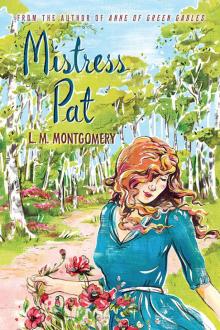 Mistress Pat
Mistress Pat A Tangled Web
A Tangled Web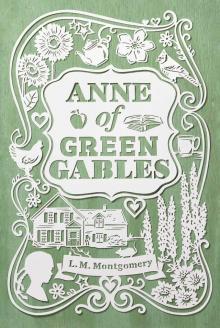 Anne of Green Gables
Anne of Green Gables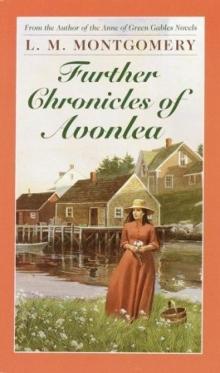 Further Chronicles of Avonlea
Further Chronicles of Avonlea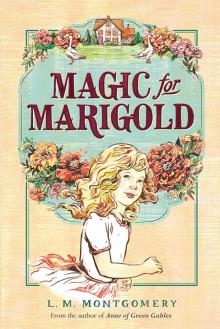 Magic for Marigold
Magic for Marigold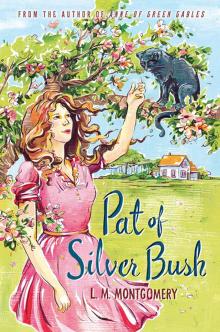 Pat of Silver Bush
Pat of Silver Bush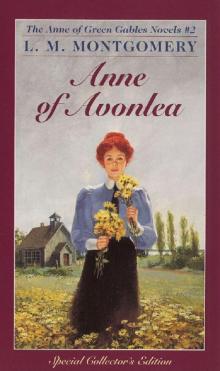 Anne of Avonlea
Anne of Avonlea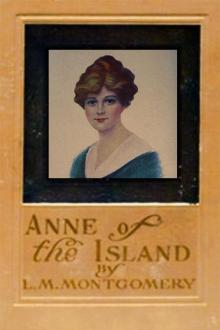 Anne of the Island
Anne of the Island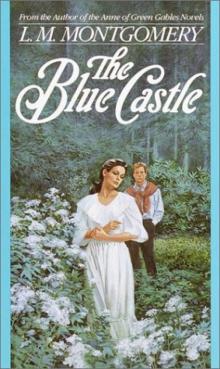 The Blue Castle
The Blue Castle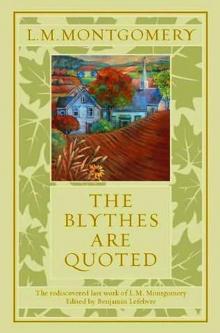 The Blythes Are Quoted
The Blythes Are Quoted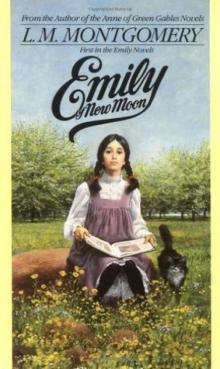 Emily of New Moon
Emily of New Moon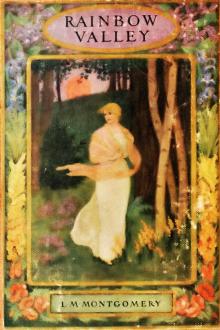 Rainbow Valley
Rainbow Valley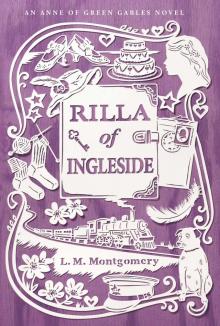 Rilla of Ingleside
Rilla of Ingleside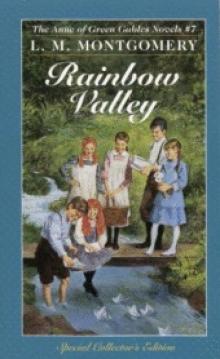 07 - Rainbow Valley
07 - Rainbow Valley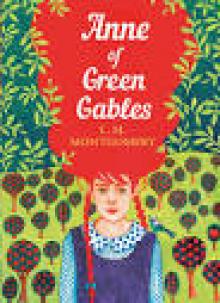 Anne of Green Gables (Penguin)
Anne of Green Gables (Penguin)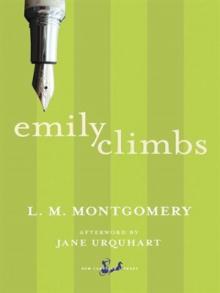 Emily Climbs
Emily Climbs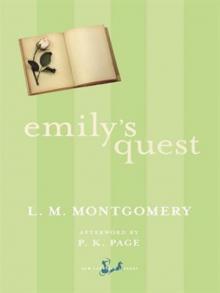 Emily's Quest
Emily's Quest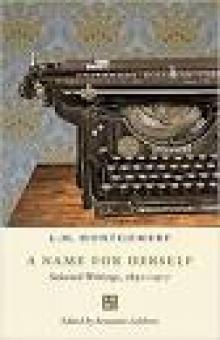 A Name for Herself
A Name for Herself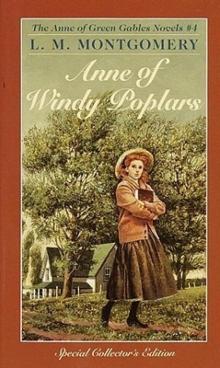 Anne of Windy Poplars
Anne of Windy Poplars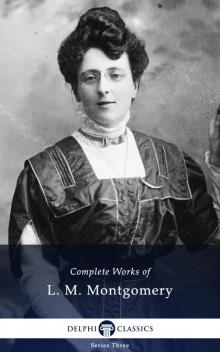 The Complete Works of L M Montgomery
The Complete Works of L M Montgomery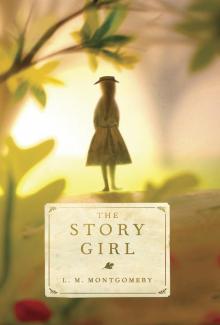 The Story Girl
The Story Girl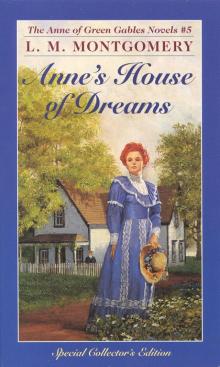 Anne's House of Dreams
Anne's House of Dreams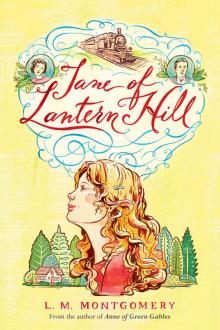 Jane of Lantern Hill
Jane of Lantern Hill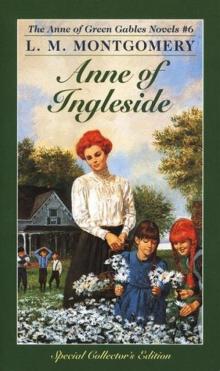 Anne of Ingleside
Anne of Ingleside